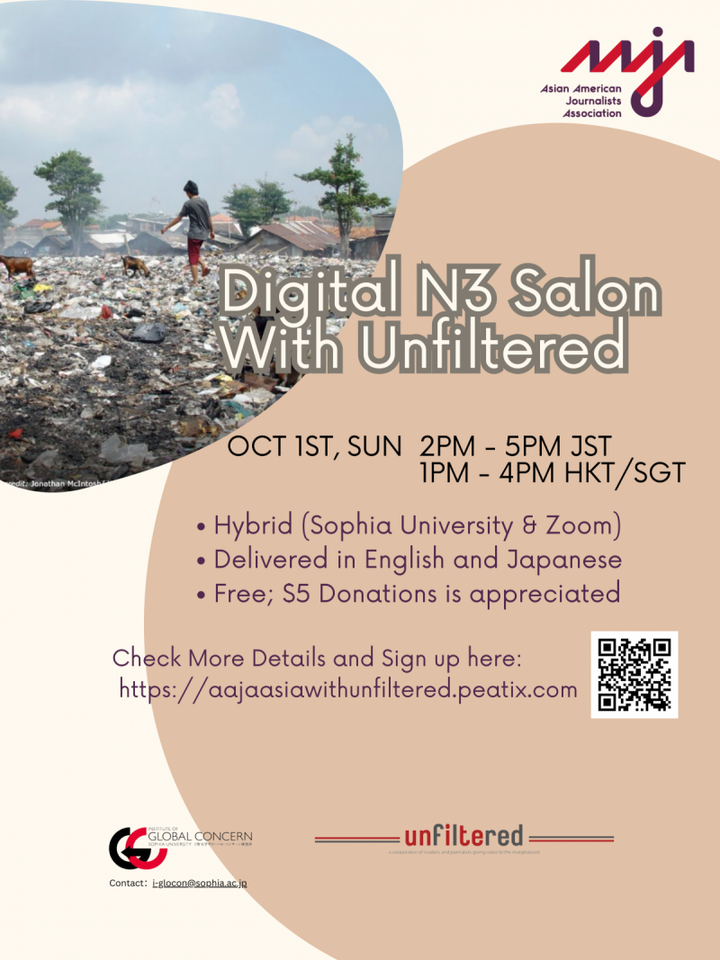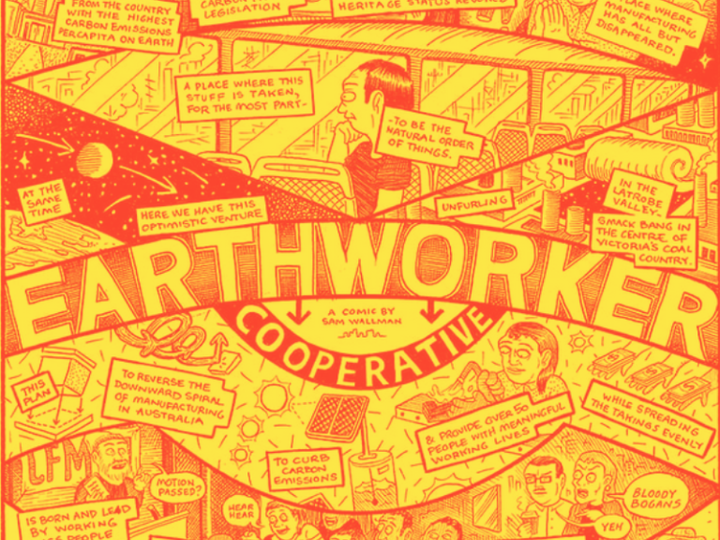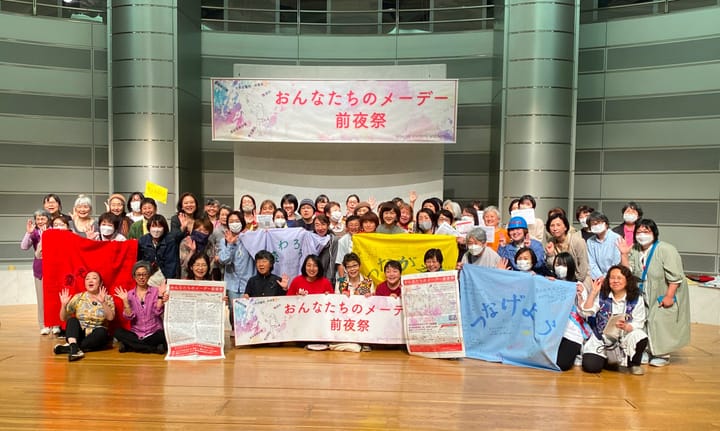Single mother shakes things up at UNIQLO

Pay dispute shines spotlight on supply chains and justice
A factory responsible for producing products for retail chain Uniqlo has closed, leaving 4,000 workers out on the streets without work or any severance pay. Indonesian national Wani Rena Napishul was one of the employees working there who was laid off, and has come to Japan to pursue talks with UNIQLO. We delve into what is actually transpiring in the garment supply chain.
Tokyo’s Shinjuku district is renowned as a bustling shopping and entertainments center popular with young trendy urbanites. But on Oct. 13, it became the stage for a diminutive indonesian woman, who stood defiantly and raised her voice in front of Biclo, a large commercial building shared by retailing giants UNIQLO and BIC Camera.
Wani Rena Napishul is a former worker of 23 years at an apparel factory belonging to Java Garment (JG) in Tangerang, Indonesia, which for the past to years had grown reliant on large orders placed by UNIQLO through their fast retailing business. It came as a shock then, when in October of 2014, UNIQLO abruptly cancelled their contract, forcing the factory to declare bankruptcy, leaving 4,000 factory workers on onto the street without severance pay. Ninety percent of those workers who were laid off were women.
Wani has been pleading for accountability from UNIQLO, demanding an audience with the retailer’s CEO Tadashi Yanai. “UNIQLO is responsible for our factory’s failure. Yanai-san we are here! Come meet us and hear what we have to say!” she shouts from outside the Bicol building.
A group of Wani’s supporters handed out leaflets to those passing by, singing the Indonesian national anthem (originally a song that inspired ethnic independence) and the labor song “Solidarity is Forever.” Occasionally those passing by stopped to to talk with them, some asking why the Indonesian President, Joko Widodo, doesn’t get involved. Others questioned why a private company such as UNIQLO shouldn’t have the right to seek cheaper contracts. People take out their smartphones to take pictures and videos of the scene. Attention toward the protesters grows day by day.
UNIQLO is an apparel company that has grown rapidly under a business model that incorporates the entire aparel manufacturing process from procurement of materials, to the development and manufacturing through to the distribution and retail of products, a business model known as “SPA” (Specialty store retails of Private label Apparel).
CEO, Yanai, who is 70 and also serves as company president, has overseen sales exceeding ¥2 trillion a year, seeing record high profits in 2018 exceeding ¥154.8 billion (up 7.3% from the previous year).
In 2012, JG’s apparel factory was incorporated into UNIQLO’s SPA supply chain and its UNIQLO contract resulted in more than half of the factory’s production going toward the manufacture of UNIQLO products.
 As a team leader in the knit department, Wani needed to work hard to keep up with demand. Despite the high volume of products being manufactured at the factory, wages after the UNIQLO contract fell below the minimum wage (less than ¥20,000 a month in 2013).
As a team leader in the knit department, Wani needed to work hard to keep up with demand. Despite the high volume of products being manufactured at the factory, wages after the UNIQLO contract fell below the minimum wage (less than ¥20,000 a month in 2013).
“I no longer had the right to menstrual leave or maternity leave,” says Wani. ” In Indonesia, we have the right to take short leaves of absence in order to breast feed (our babies), but if I had exercised that right, I wouldn’t have been able to achieve the production goals given by UNIQLO.”
When her husband fell ill and was taken to hospital, her request to leave early was declined because workers were prohibited from leaving the factory until the daily production goals were met. “My husband took his last breath without me there to care for him,” explains Wani.
In 2013, when workers at JG’s factory formed a union in affiliation with the Indonesian Metalworkers Federation (FSPMI), JG went on the offensive. Chairman of the union, Teddy Putra, was taken off the production line and finally laid off in July 2014. Other union leaders were also transferred and the dismissal of workers became widespread.
Even so, just as the union was achieving some success in its fight with JG to secure minimum wages, the company declared bankruptcy. After declaring bankruptcy, all of the company assets were sold and they were able to pay workers their wages, however 5.5 million dollars (about ¥62 million) in severance pay remains unpaid.
Following their dismissal, many of the workers occupied the factory for a year. “We were forced to leave our apartments because we could no longer afford rent, so we moved into the factory,” Wani recounts, “We also needed to prevent (sewing) machines from being taken away”.
Wani’s two daughters, who were then just 16 and 11 years of age, moved into the factory with their mother and commuted to school from there each day. The older daughter now lives with a relative. “It’s hard as a mother not to be able to live with my child,” Wani says.
Wani is currently looking for work, but has found it hard to find somewhere that will employ her due to her age. In desperation, she took a temporary job at a seamstress company that pays ¥400 a day. Despite her hard work in order to put food on the table, she was not able to afford treatment when one of her daughters became ill.
UNIQLO has contracts with 146 factories in seven countries including China, Vietnam and Indonesia, to produce over 1.3 billion items of clothing annually. In Indonesia, UNIQLO and other similar brands are concentrating their production in regions where there is less of a union presence and the wages are lower.
In response to growing criticism, UNIQLO posted a statement on its homepage in January, 201c5 where it claimed that the contract with JG Factory was terminated due to quality control issues and delays in delivery.
Furthermore, UNIQLO stated that all necessary payments such as consignment fees were completed and have denied legal liability for the bankruptcy. Although executive officer, Takuya Jinbo, explains UNIQLO’s SPA supply chain as “directly and seamlessly connecting production plants (factories), warehouses, retail stores and headquarters,” that connection does not appear to be seamless when factories in the chain become insolvent.
Furthermore, although the company claims that it ‘monitor(s) working conditions throughout the supply chain,” union leader Putra is clear that this is not done appropriately, with a 2013 audit conducted by JG employees without any union members being consulted.
Indeed, UNIQLO lags behind other brands in actions taken after the JG factory bankruptcy. Jack Wolfskin (whose headquarters are in Germany), which also had contracts with the factory, paid financial compensation commensurate with their order volume. As Muhamad Dalisman, another worker that came to Japan with Wani, explains: “In a similar case, Adidas and Nike paid compensation based on their order.”
If UNIQLO wants to be considered a ‘global brand’ it is high time they start taking more responsibility for the conditions at their production facilities, he adds.
Wani’s visit to Japan was made possible with the support of the Clean Clothes Campaign (CCC), an international NGO that tackles supply chain issues. “Wani-san and her colleagues coming to Japan has helped Japanese Labor Unions to understand issues of garment supply chains,” said Haruhi Tono, an official of Yokohama Action Research, one of the groups involved in supporting Wani.
Although Wani was not able to meet with UNIQLO executives during the visit, she felt energized by newly forged friendships with other workers and Japanese citizens.
A meeting with the Japanese government was also seen as a success. “I want everyone in Japan to know how hard we’ve worked so that UNIQLO garments were made with the highest quality for the cheapest price,” she said when asked what she would like to communicate to Japanese consumers who wear the UNIQLO brand.
The issues pertaining to UNIQLO’s supply chain are not just of concern for company executives, but one that consumers of UNIQLO’s products must also consider, she added.
Profile:
Wani Rena Napishul, 46, is a single mother of two children. She was employed at Java Garment’s apparel factory in Tangerang, Indonesia for 23 years, the last two of which she primarily worked on producing knitwear to fulfil the JG factory’s contract with UNIQLO. Wani is a member of the Indonesia Metal Workers Union (FSPMI) and JG Factory’s labor union. She is still awaiting severance pay owed to her when JG filed for bankruptcy.


